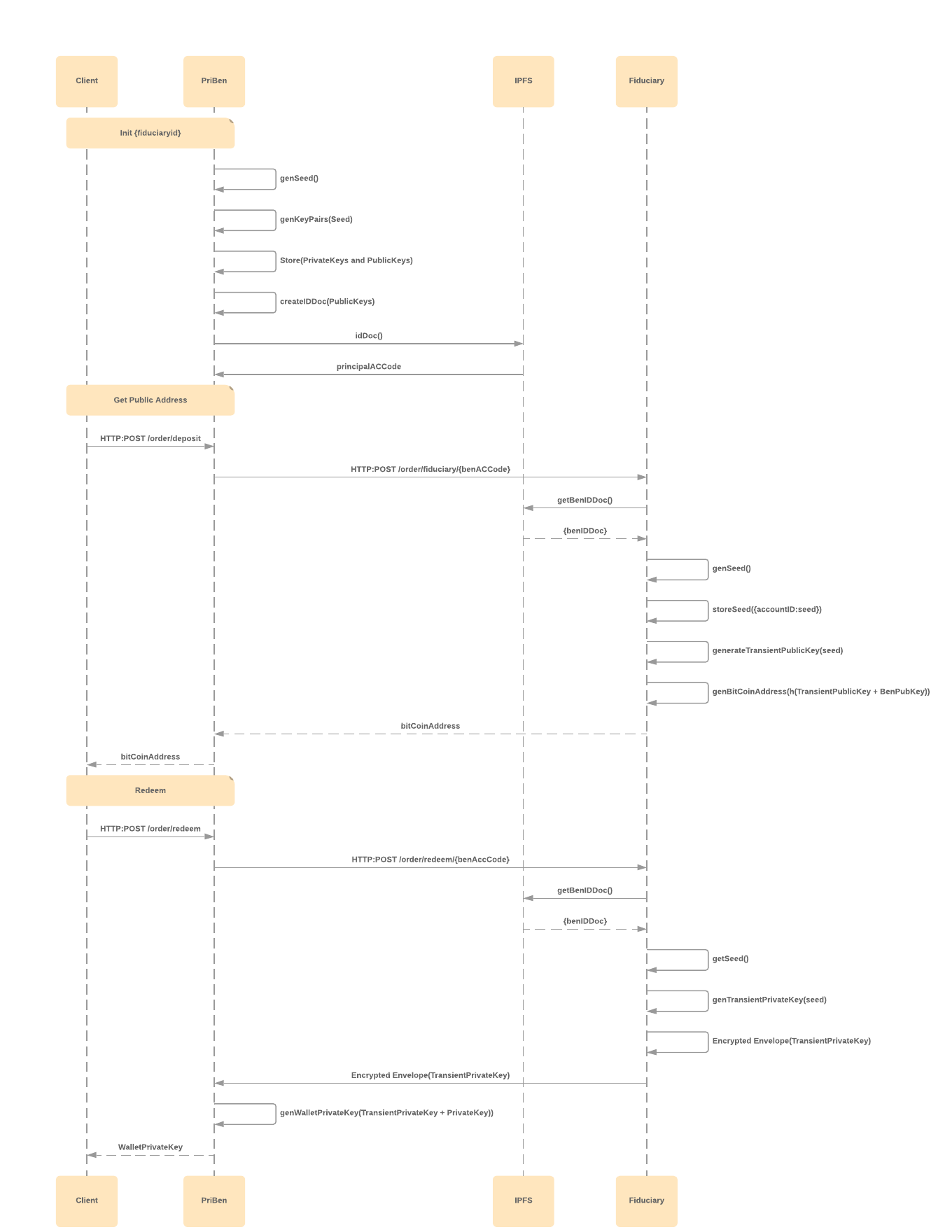Apache Milagro (Incubating) Decentralized Trust Authority
The Apache Milagro (Incubating) Decentralized Trust Authority (D-TA) is a collaborative key management server.
The D-TA facilitates secure and auditable communication between people who to use key pairs (Principal) and service providers who can keep the secret keys safe (Master Fiduciary). It is written in Go and uses REST services based on the GoKit microservices framework, it uses IPFS to create a shared immutable log of transactions and relies on Milagro-Crypto-C for it's crypto.
Plugins
The Milagro D-TA provides a basic set of services for creating identities for actors in the system, and passing encrypted communication between them but it assumes that different service providers will have their own "special sauce" for securely storing secret keys, so the vanilla services can be extended using a plugin framework. Two basic plugins are included in this release to give you an idea of how this can be done.
- BitcoinPlugin Generates a Bitcoin address and reveals the corresponding secret key
- SafeGuardSecret Encrypts a string and decrypts it again
Installation
Below are instructions on how to build and run the Milagro D-TA either using Docker or as developments builds for Linux and Mac.
These instructions will build the service with default settings including an embeded IPFS node connected to a private IPFS network and an embedded "Bolt" database. This will get you up and running quickly but is not recommended for production use!
Docker
To see the Milagro D-TA in action you can run the Milagro D-TA in a docker container. This is currently the preferred method to build and run the D-TA. Tested on Ubuntu 19.04 and MacOS but should run in any Docker environment.
Prerequisites
Build & Run on Docker
git clone https://github.com/apache/incubator-milagro-dta.git
cd incubator-milagro-dta
docker build -t mydta .
docker run -p5556:5556 mydta
Build and run on development machine
Tested on Ubuntu 19, MacOS 10.14 Mojave & Debian 10
Install development Tools on Ubuntu/Debian
sudo apt-get update
sudo apt-get install \
ca-certificates \
cmake \
g++ \
gcc \
git \
make \
libtool \
automake \
libssl-dev \
jq \
curl
Install development Tools on MacOS
brew install \
cmake \
autoconf \
automake \
libtool
golang
Download and install Golang
liboqs
liboqs is a C library for quantum-resistant cryptographic algorithms. It is a API level on top of the NIST round two submissions.
git clone https://github.com/open-quantum-safe/liboqs.git
cd liboqs
git checkout 7cb03c3ce9182790c77e69cd21a6901e270781d6
autoreconf -i
./configure --disable-shared --disable-aes-ni --disable-kem-bike --disable-kem-frodokem --disable-kem-newhope --disable-kem-kyber --disable-sig-qtesla
make clean
make -j
sudo make install
AMCL
AMCL is required
Build and install the AMCL library
git clone https://github.com/apache/incubator-milagro-crypto-c.git
cd incubator-milagro-crypto-c
git checkout feecb27e7cc24ba5809405cc3efe74b0f7ac69ef
mkdir build
cd build
cmake -D CMAKE_BUILD_TYPE=Release -D BUILD_SHARED_LIBS=ON -D AMCL_CHUNK=64 -D AMCL_CURVE="BLS381,SECP256K1" -D AMCL_RSA="" -D BUILD_PYTHON=OFF -D BUILD_BLS=ON -D BUILD_WCC=OFF -D BUILD_MPIN=OFF -D BUILD_X509=OFF -D CMAKE_INSTALL_PREFIX=/usr/local -DCMAKE_C_FLAGS="-fPIC" ..
make
make test
sudo make install
pqnist
git clone https://github.com/apache/incubator-milagro-dta.git
cd incubator-milagro-dta/libs/crypto/libpqnist
mkdir build
cd build
cmake -D CMAKE_INSTALL_PREFIX=/usr/local -D BUILD_SHARED_LIBS=ON ..
make
export LD_LIBRARY_PATH=$LD_LIBRARY_PATH:/usr/local/lib
make test
sudo make install
Set the library path
export C_INCLUDE_PATH=$C_INCLUDE_PATH:/usr/local/lib
export LD_LIBRARY_PATH=$LD_LIBRARY_PATH:/usr/local/lib
Build & Run Instructions
./build.sh
To run the service with default settings:
./target/milagro init
./target/milagro daemon
Documentation
You can find documentation for Milagro D-TA in the main Milagro docs site
This includes a quick start guide that will show you how to get Milagro D-TA to "do stuff"
Contributing
Key pairs are becoming central to our online lives, and keeping secret keys safe is a growing industry, we hope to create an ecosystem of custodial service providers who collaborate to make the Internet a safer place for everyone. We are keen to get contributions and feedback from anyone in this space. This is a brand new project so our development processes are still being figured out, but if you have suggestions, questions or wish to make contributions please go ahead raise an issue and someone on the team will get right on it.
Crypto Notice
This distribution includes cryptographic software. The country in which you currently reside may have restrictions on the import, possession, use, and/or re-export to another country, of encryption software. BEFORE using any encryption software, please check your country's laws, regulations and policies concerning the import, possession, or use, and re-export of encryption software, to see if this is permitted. See http://www.wassenaar.org/ for more information.
The Apache Software Foundation has classified this software as Export Commodity Control Number (ECCN) 5D002, which includes information security software using or performing cryptographic functions with asymmetric algorithms. The form and manner of this Apache Software Foundation distribution makes it eligible for export under the "publicly available" Section 742.15(b) exemption (see the BIS Export Administration Regulations, Section 742.15(b)) for both object code and source code.
Disclaimer
Apache Milagro is an effort undergoing incubation at The Apache Software Foundation (ASF), sponsored by the Apache Incubator. Incubation is required of all newly accepted projects until a further review indicates that the infrastructure, communications, and decision making process have stabilized in a manner consistent with other successful ASF projects. While incubation status is not necessarily a reflection of the completeness or stability of the code, it does indicate that the project has yet to be fully endorsed by the ASF.
Credits
- Design and Concept... Brian Spector
- Core Algorithm and Services... Chris Morris
- Framework and Refactoring... Stanislav Mihaylov
- Crypto Genius... Kealan McCusker
- Keeper of "The Apache Way"... John McCane-Whitney
- Prototype and Cat Herding... Howard Kitto


